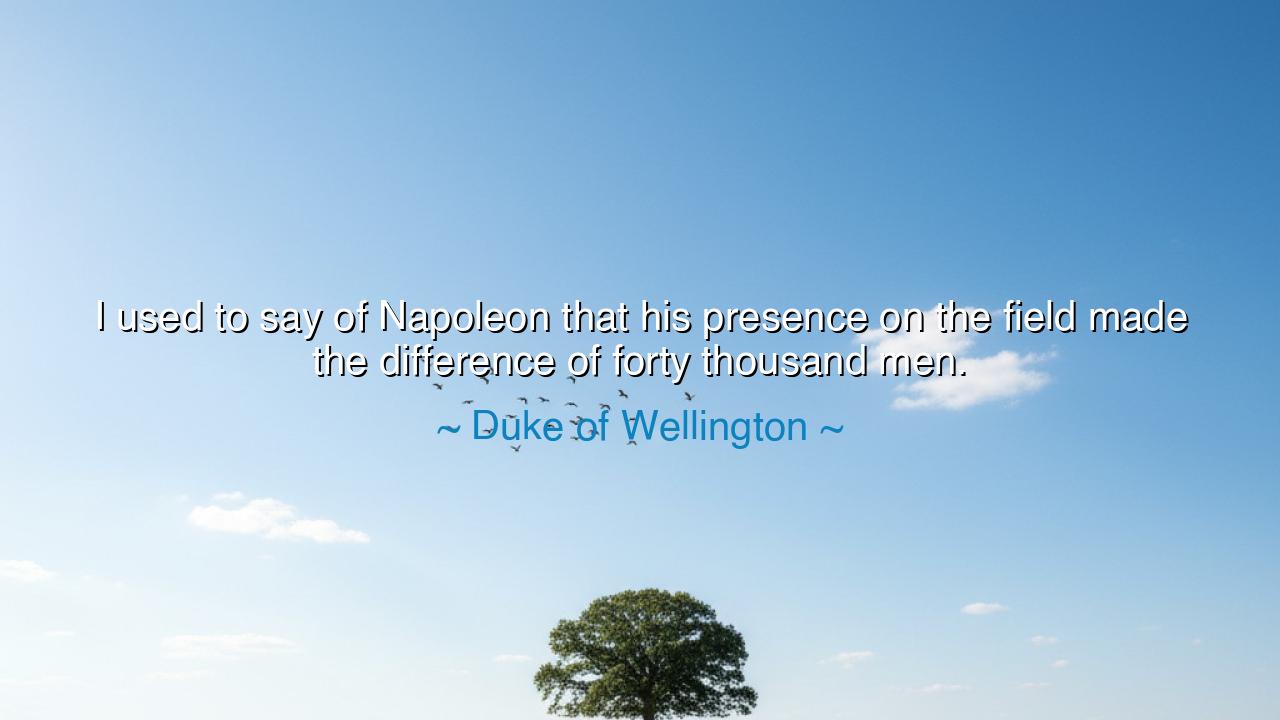
I used to say of Napoleon that his presence on the field made the
I used to say of Napoleon that his presence on the field made the difference of forty thousand men.






Come, O children, and hear the words of the great Duke of Wellington, who, in speaking of the mighty Napoleon, said, “I used to say of Napoleon that his presence on the field made the difference of forty thousand men.” These words are not mere praise; they are a testament to the profound impact that the presence of a leader, a single individual, can have on the course of history. The Duke speaks not just of Napoleon’s strategic brilliance, but of the very aura that he carried, the confidence and power that radiated from him, influencing the men around him in ways that mere numbers could never account for. This is the power of leadership, a force that transcends the physical and touches the very spirit of those who follow.
Think, O children, of the ancient warriors who knew well the power of a leader’s presence. Alexander the Great, though his army was vast, understood that it was not only the strength of his troops but his own influence on the battlefield that determined victory. When he led, his courage and vision inspired his soldiers to fight not for mere survival, but for the glory of their leader, for the future of the empire he promised. The mere sight of Alexander on the field could turn the tide of battle, just as Napoleon’s presence could make the difference between triumph and defeat. This, O children, is the essence of leadership—not merely the control of men, but the inspiration that moves them beyond their limitations.
It is the presence of a leader that shapes the fate of a battle, just as Napoleon’s presence, in the words of the Duke, added the strength of forty thousand men. The spirit of a leader, the aura they project, can make the impossible seem possible. The history of Napoleon’s campaigns is filled with such moments—when his mere presence turned the tide of battle, rallying his soldiers and shaking his enemies. He was not simply a commander; he was a force that stirred the souls of those around him, a living symbol of the power of determination and vision.
Consider the Battle of Austerlitz, one of Napoleon’s most famous victories, where his presence and genius on the battlefield led his army to defeat a much larger coalition of Russian and Austrian forces. It was not just the number of soldiers he commanded, but his ability to inspire them, to shape their resolve, that made all the difference. In that moment, Napoleon stood as more than a general—he embodied the spirit of victory, and his soldiers, seeing his unwavering confidence, were willing to give everything in his name. The same principles apply not just in warfare, but in life: the power of one determined soul can sometimes shift the course of an entire movement.
And yet, O children, this power is not limited to generals and kings alone. In our own lives, we all carry the potential to be like Napoleon on the battlefield. We may not command armies, but we can command our own lives, and the lives of others through the strength of our presence. Whether as parents, teachers, or leaders in our communities, we have the ability to inspire, to shift the course of events simply by the way we carry ourselves, the energy we bring into a room, and the clarity of our vision. The presence that the Duke of Wellington admired in Napoleon is the same presence we can cultivate within ourselves—one that brings confidence, strength, and direction to those around us.
The lesson here, O children, is that leadership is not just about titles or commands—it is about the impact of your presence. The difference that Napoleon made was not just in his strategic brilliance but in the way he instilled a sense of purpose, of meaning, and of unshakable resolve in the hearts of his soldiers. You, too, can make a difference by embodying the qualities of a true leader: the ability to inspire, to uplift, and to empower others through the sheer force of your presence and vision.
So, O seekers of wisdom, let your presence be your strength. Walk with confidence and purpose, and know that in doing so, you can inspire those around you to greatness. Like Napoleon, let your vision guide you, and like the great leaders of old, let your presence be the spark that ignites the fire of action in those who follow you. Your leadership, born not just of strategy but of spirit, can change the course of history—whether on the battlefield, in the classroom, or in the daily struggles of life.






AAdministratorAdministrator
Welcome, honored guests. Please leave a comment, we will respond soon